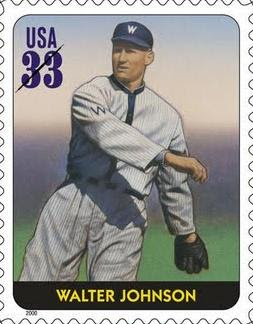
Walter Perry Johnson (November 6, 1887 – December 10, 1946), nicknamed "Barney" and "The Big Train", was a Major League Baseball right-handed pitcher. He played his entire 21-year baseball career for the Washington Senators (1907–1927). He would later serve as manager of the Senators from 1929–1932 and for the Cleveland Indians from 1933–1935.
One of the most celebrated and dominating players in baseball history, Johnson established several pitching records, some of which remain unbroken. He remains by far the all-time career leader in shutouts with 110, second with 417 wins, and fourth in complete games with 531. He once held the career record in strikeouts with 3,509 and was the only player in the 3,000 strikeout club for over 50 years until Bob Gibson recorded his 3,000th strikeout in 1974. Johnson led the league in strikeouts a Major League record 12 times — one more than current strikeout leader Nolan Ryan — including a record eight consecutive seasons.

Johnson won renown as the premier power pitcher of his era. Ty Cobb recalled his first encounter with the rookie fastballer:
"On August 2, 1907, I encountered the most threatening sight I ever saw in the ball field. He was a rookie, and we licked our lips as we warmed up for the first game of a doubleheader in Washington. Evidently, manager Pongo Joe Cantillon of the Nats had picked a rube out of the cornfields of the deepest bushes to pitch against us... He was a tall, shambling galoot of about twenty, with arms so long they hung far out of his sleeves, and with a sidearm delivery that looked unimpressive at first glance... One of the Tigers imitated a cow mooing, and we hollered at Cantillon: 'Get the pitchfork ready, Joe-- your hayseed's on his way back to the barn.'
...The first time I faced him, I watched him take that easy windup. And then something went past me that made me flinch. The thing just hissed with danger. We couldn't touch him... every one of us knew we'd met the most powerful arm ever turned loose in a ball park."
Although a lack of precision instruments prevented accurate measurement of his fastball, in 1917, a Bridgeport, Connecticut munitions laboratory recorded Johnson's fastball at 134 feet per second, which is equal to 91.36 miles per hour (147.03 km/h), a velocity which was virtually unique in Johnson's day, with the possible exception of Smoky Joe Wood. Johnson, moreover, pitched with a sidearm motion, whereas power pitchers are normally known for pitching with a straight-overhand delivery. Johnson's motion was especially difficult for right-handed batters to follow, as the ball seemed to be coming from third base.
The overpowering fastball was the primary reason for Johnson's exceptional statistics, especially his fabled strikeout totals. Johnson's record total of 3,508 strikeouts stood for more than 55 years until Nolan Ryan, Steve Carlton, and Gaylord Perry (in that order) all surpassed it in 1983. Johnson, as of 2010, ranks ninth on the all-time strikeout list, but his total must be understood in its proper context. Among his pre-World War II contemporaries, only two men finished within one thousand strikeouts of Johnson: runner-up Cy Young with 2,803 (705 strikeouts behind) and Tim Keefe at 2,562. Bob Feller, whose war-shortened career began in 1936, later ended up with 2,581.
Walter Johnson on a 1909-1911 American Tobacco Company baseball card

As a right-handed pitcher for the Washington Nationals/Senators, Walter Johnson won 417 games, the second most by any pitcher in history (after Cy Young, who won 511). He and Young are the only pitchers to have won 400 games.
In a 21-year career, Johnson had twelve 20-win seasons, including ten in a row. Twice, he topped thirty wins (33 in 1912 and 36 in 1913). Johnson's record includes 110 shutouts, the most in baseball history. Johnson had a 38-26 record in games decided by a 1-0 score; both his win total and his losses in these games are major league records. Johnson also lost 65 games because his teams failed to score a run. On September 4, 5 and 7, 1908, he shut out the New York Highlanders in three consecutive games.
No comments:
Post a Comment